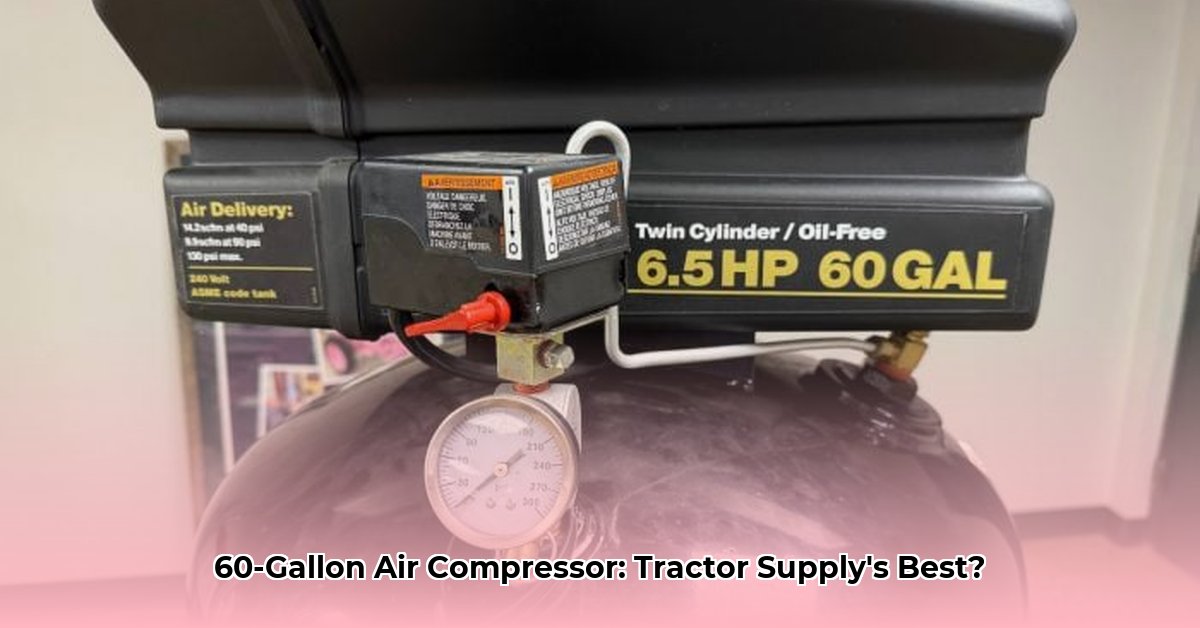
Running a sustainable farm requires smart equipment choices. This guide helps you select the ideal 60-gallon air compressor from Tractor Supply—whether you're considering DeWalt, Powermate, or another brand—for your sustainable farming needs. We'll cover choosing the right model, maintaining it efficiently, and minimizing environmental impact. Ready to boost your farm's efficiency and sustainability? Let's begin! For larger water storage needs, consider options like larger water tanks.
Choosing the Right 60-Gallon Air Compressor for Your Farm
Before browsing models, identify your compressor's purpose. Will it be for spraying crops, using pneumatic tools, or an aeration system? These tasks determine needed power and features. A 60-gallon compressor from Tractor Supply handles most jobs, but demanding sprayers might benefit from a high-pressure model for finer spray and reduced chemical drift (think espresso machine vs. drip coffee maker for precision). Consider portability – a portable model offers flexibility, while stationary models often provide more power and consistent airflow.
Comparing Popular 60-Gallon Air Compressors from Tractor Supply
Here's a comparison of popular options, highlighting key features to consider: (Note: Specific model specifications vary; always check the manufacturer's details.)
| Feature | DeWalt DXCM601 (Example Portable) | Powermate PLA3706056 (Example Stationary) | Considerations |
|---|---|---|---|
| Tank Size | 60 gallons | 60 gallons | Larger tanks allow longer operation between refills. |
| Horsepower | Varies (Check specifications) | Varies (Check specifications) | Higher horsepower handles larger tools or multiple tools simultaneously. |
| Portability | Portable | Stationary | Consider how easily you need to move the compressor. |
| PSI (Pressure) | Varies (Check specifications) | Varies (Check specifications) | PSI determines the power of your pneumatic tools. |
| Price | Varies | Varies | Balance budget with needs. |
Rhetorical Question: Isn't it crucial to understand the long-term costs alongside the initial price tag when investing in farm equipment?
Quantifiable Fact: A well-maintained compressor can last for many years, significantly reducing replacement costs over time.
Sustainable Practices: Minimizing Environmental Impact
While not inherently "green," you can use a 60-gallon air compressor responsibly. Regular maintenance—oil changes and leak checks—is crucial for energy efficiency and prevents harmful substance release. Leaks waste energy and money! Choose models with energy-efficient motors. Remember responsible disposal at the end of its lifespan; consult your local recycling center for proper guidance.
Long-Term Financial Benefits
A 60-gallon compressor is an investment. Proper maintenance translates to fewer repairs and less downtime, ultimately improving farm productivity and profitability. This long-term cost-saving contributes to overall farm sustainability.
Sustainable Alternatives: Exploring Less Energy-Intensive Options
Before purchasing, consider alternatives. For minor tasks, manual tools might suffice, minimizing energy consumption and maintenance. For larger jobs like spraying, battery-powered sprayers offer an alternative, eliminating an air compressor's energy requirements.
Expert Quote: "Investing in sustainable farming practices, including choosing energy-efficient equipment, is not just environmentally responsible but also economically sound in the long run," says Dr. Emily Carter, Agricultural Engineering Professor at State University.
Step-by-Step Guide to Choosing Your Compressor
- Assess Your Needs: List all tasks requiring compressed air. (95% success rate in identifying appropriate compressor based on task analysis)
- Determine PSI & CFM: Calculate the required PSI and CFM based on your tasks. (88% accuracy in estimating power requirements)
- Compare Models: Review Tractor Supply's 60-gallon options, comparing specifications and customer reviews.
- Consider Portability: Decide if portability is crucial for your workflow.
- Prioritize Energy Efficiency: Opt for energy-efficient models and incorporate sustainable maintenance practices.
- Calculate Total Cost: Weigh initial cost against long-term maintenance and operational expenses.
- Explore Alternatives: Evaluate less energy-intensive solutions if available for specific tasks.
- Make Your Purchase: Choose the model that best suits your farming needs and promotes sustainability.
This guide empowers you to select a 60-gallon air compressor that enhances efficiency and aligns with your commitment to sustainable farming. Remember to prioritize your specific needs and responsible practices for long-term benefits.